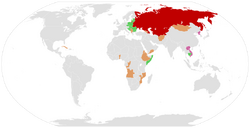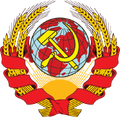| The following New Union page is under construction.
Please do not edit or alter this article in any way while this template is active. All unauthorized edits may be reverted on the admin's discretion. Propose any changes to the talk page. |

Soviet co-operation by nation (legend).
The Ryzhkov Doctrine (Russian: Доктрина Рыжкова, Doktrina Ryzhkova) was a foreign policy initiated by the Soviet Union during the administration of Nikolai Ryzhkov (1995-2005). The policy is seen as a major reversal to Gorbachev's so-called "Sinatra Doctrine," in which the USSR openly co-operated with several post-Communist nations.
Nikolai Ryzhkov expressed the desire to bring further co-operation with several post-Communist states, both as a means to prevent infighting and promote democracy, as well as to bring economic co-operation as part of his economic reforms within the Soviet Union. The move was considered highly controversial (especially within Western Europe and the United States), as this was seen as a means for Moscow to re-establish its former empire, further supported upon the reports of Soviet political aid to several post-Communist nations (most notably Cuba, Ethiopia, and Yugoslavia), as well as potential military aid to Angola.
Despite western feelings, many saw it as being a major benefit for the post-Communist world. The co-operation was only limited to economics and some political co-operation, and never went beyond what was necessary. All of the nations in co-operation peacefully transitions towards a market economy and democratic reforms.
The Soviet Union also stayed in close co-operation with Laos, North Korea, and Vietnam; all of which remained single-party Communist states. Due to continued co-operation, North Korea's nuclear weapons program was greatly reduced.
| |||||||||||||||||

